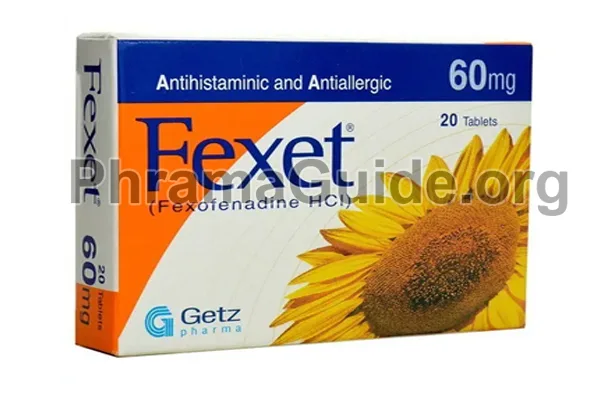Fexet tablet is an antihistamine used to treat hay fever, allergic rhinitis, and other allergies. It is a second-generation antihistamine, which means it is less likely to cause sedation compared to some older antihistamines. Following are some common and off-label uses of Fexet tablets:
Common Uses of Fexet Tablet
- Allergic Rhinitis: Fexet tablet is used to treat seasonal or perennial allergic rhinitis, which is characterized by inflammation and irritation of the nasal passages due to an allergic reaction.
- Chronic Idiopathic Urticaria: Fexet tablet is also used to treat chronic idiopathic urticaria, which is a skin condition that causes itchy and swollen hives that last for more than six weeks without a known cause.
- Allergic Conjunctivitis: Fexet tablet is used to treat allergic conjunctivitis, which is inflammation and irritation of the conjunctiva (the tissue that lines the inside of the eyelids and covers the white part of the eye) due to an allergic reaction.
Off-label Uses of Fexet Tablet
- Eosinophilic Esophagitis (EoE): Eosinophilic esophagitis is a chronic allergic inflammatory condition of the esophagus. Fexet tablets are used as part of the treatment plan for EoE.
- Chronic Pruritus (Itching): Fexet tablet has been used to relieve chronic pruritus (itching) associated with various conditions, although its effectiveness for this purpose is not well-established.
- Atopic Dermatitis (Eczema): While antihistamines are not typically considered first-line treatment for atopic dermatitis, some healthcare providers may prescribe Fexet tablets to help manage itching associated with this skin condition.

What is Fexet?
Fexet is one of the leading brands of Fexofenadine, manufactured and marketed by Getz Pharmaceuticals (Pvt) Ltd, Pakistan.
Fexet Alternatives : Other Similar Brands
The following are some other brands that can be used as an alternative to Fexet.
- Telfast : Sanofi Aventis (Pakistan) Ltd.
- Fexo : Hilton Pharmaceuticals (Pvt) Ltd, Pakistan.
- Aloc : Bosch Pharmaceuticals (Pvt) Ltd, Pakistan.
- Softin F : Werrick Pharmaceuticals, Pakistan.
- Fifex : Shaigan Pharmaceuticals (Pvt) Ltd, Pakistan.
- Fexofast : Platinum Pharmaceuticals (Pvt) Ltd, Pakistan.
- Novahist : Pacific Pharmaceuticals Ltd, Pakistan.
- Fendina : Highnoon Laboratories Ltd, Pakistan.
- Fexofin : Bio Labs (Pvt) Ltd, Pakistan.
- Genfix : Genix Pharmaceuticals (Pvt) Ltd, Pakistan.
Fexet : Available Formulations and Strengths
Presently, Fexet is available in Tablets Form
Fexet Tablets : 60mg, 120mg, and 180mg Strengths.
Fexet-D Tablet : Fexofenadine 60mg, and Pseudoephedrine 120mg strength.
Who Should Not Use Fexet Tablets?
- The primary contraindication for using the Fexet tablet is hypersensitivity to the drug or its components. People who have previously experienced an allergic reaction to this medication should not use it.
- People with kidney or liver disease may need to adjust their dosage due to the fact that these organs play a role in breaking down and eliminating Fexet tablets from the body.
- Pregnant or breastfeeding women may also need to consult with a doctor before using Fexet tablets as some studies suggest potential risks associated with it during these times.
- People who suffer from high blood pressure or heart problems should also discuss their condition and treatment plan with a medical professional prior to using Fexet as it can potentially increase blood pressure levels and cause palpitations in some cases.
What is the Recommended Daily Dosage of Fexet?
Fexet Tablet Dose for Adults and Children (12 years of age and older):
- One tablet of 60mg, once a day.
Higher doses are usually not recommended since the benefits of taking more than the recommended daily dose have not been established.
How Fexet Works?
Fexet tablet works by blocking the action of histamine, a chemical that causes allergy symptoms.
Related Links:

Leave A Comment